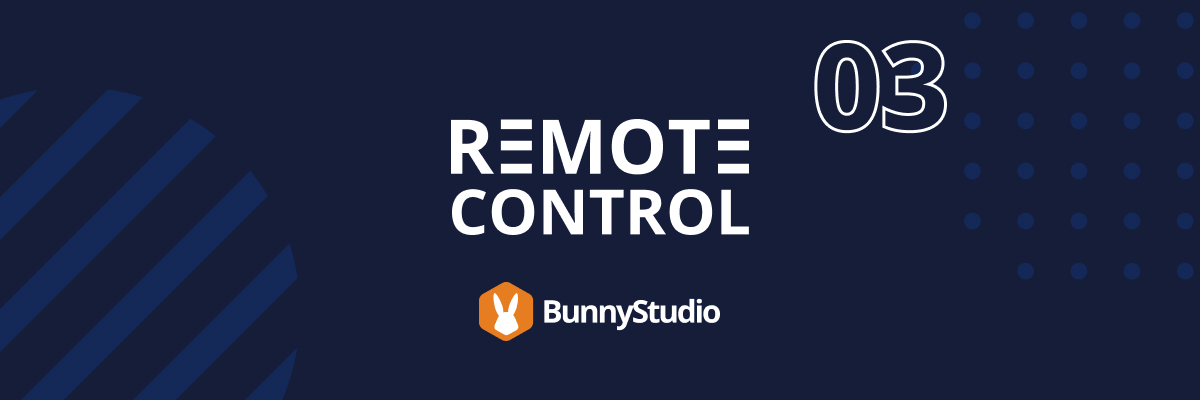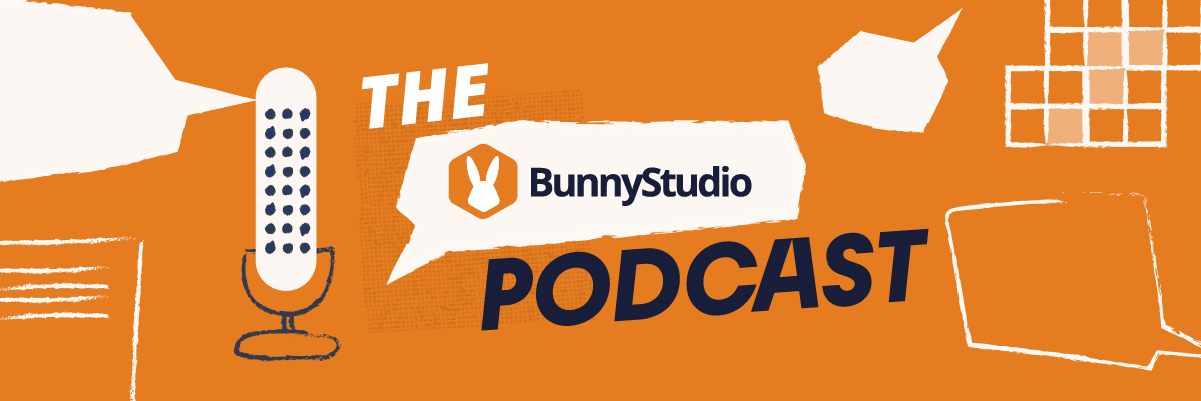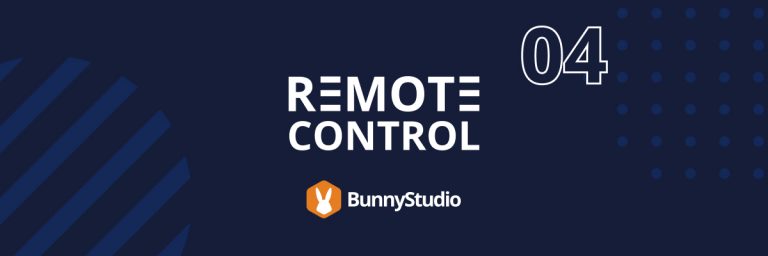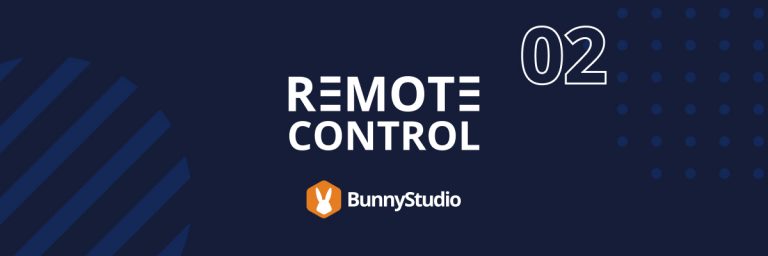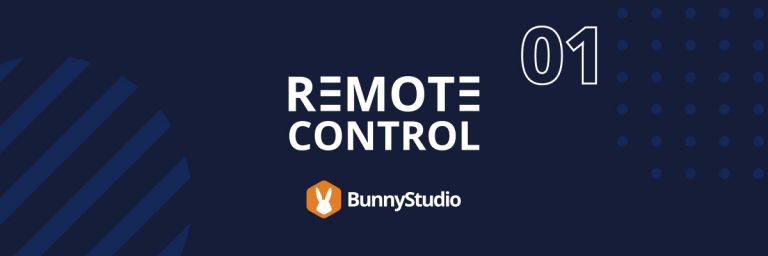— PROLOGUE —
Recruiting locally can give us the best talent in our city… but remote recruiting can fill our teams with the best talent in the world.
Remote recruiting is more than just putting offices in homes. Done RIGHT… it’s about breaking traditional barriers and creating new opportunities for people to connect.
That’s exactly what happened to Jerry Ajayi. He learned to code by hand and now works at a multinational tech company. He overcame barriers of distance – and access.
In this episode, we’re looking beyond all borders to investigate the future of remote work.
— INTRO —
Hey, I’m Maika Hoekman, Head of People Operations at Bunny Studio, and I’m a remote worker.
Welcome to Remote Control: A series that helps you unlock the possibilities of remote work. Together, we’ll find success stories, expert tips, and insights to help you navigate the new office.
Remote Control is brought to you by Bunny Studio. Trusted by more than 50,000 companies every year, Bunny Studio helps businesses scale their creative needs with a vetted crowd of freelancers.
— ACT ONE —
Maika:
When it comes to finding talent, traditionally, organizations have looked locally. Because they need someone to be inside the office…that’s what ‘being at work’ meant for so long…
And besides, what employee wants a 4-hour commute?
So, for a long time companies and workers have been limited by geographical area. But, the global pandemic has shown us that this doesn’t need to be how we operate.
What if we don’t need to put someone in a cubicle?
What if your team could stay at home, and the work did the commuting?
What if, instead of ‘local recruitment pools’, there were ‘international oceans’ of talent that your company could choose from.
Bunny Studio, my company, is built on remote work. We’ve done it for 8 years, and it’s been exciting to pioneer a new way to work… But there’s still so much to learn as industries adapt.
We’re learning that the future of working remotely is not just about giving access to people from across vast distances but facilitating other forms of access as we reshape the workplace.
Jeremiah:
My name is Jeremiah, I’m a software developer at Bunny Studio. I live in Lagos, Nigeria.
I started coding at 17. So, I started out learning that on my mobile phone for a couple of months. Then my dad saw all the time that I was like, I was always keeping up late at night. So he gave me access to his PC, then I landed my first internship about a year later.
Maika:
Jerry is a programmer on the Bunny Studio team. Along with me. Our team is spread out all over the world. Many of us have never met in person. But we knew Jerry was right for us. He had valuable skills – skills we could put to use, no matter where he was.
But when your market is the entire world, you’ve got an enormous amount people to look at. And finding the right people in such a big space can be tricky.
Alexson:
If you’re a good recruiter, you can recruit anyone to any company, to any team, anywhere. It just depends on the job specification, what kind of attributes do they have or what are we looking for? What is their experience?
Maika:
Alex knows exactly what it takes to get someone with unique skills onto your team. It’s up to organizations to learn how to look farther and – wider – than just their backyard.
Alexson:
I’m on the recruiting team at a large tech company, and yeah, I’ve been recruiting for almost eight years now. I used to hire for the data center operations team in Taiwan. I don’t speak Mandarin, but we also need to find people who have good English capability and also the technical skills, and also being able to either move to Taiwan or be already based in Taiwan, there’s a lot of things you need to consider.
Maika:
Most of the time, a candidate doesn’t meet a very single specific job requirement.
But when you broaden the net and offer that position remotely, competition increases. And the chances of finding that desirable candidate goes up dramatically.
Jeremiah:
So I was given the very, very basic test, which was amazing. I shared that with a couple of friends and they were like, wow, I was very lucky. And the interview process wasn’t very, very stressful, just basic questions and it’s actually the best interview I’ve ever had. It was actually very fun.
Maika:
Here’s the thing about that test: Jerry didn’t know how hard it was. More than 95% of the other applicants failed to complete the task that Jerry found very simple. And we had applicants from across the world.
Among all of them, Jerry had that very specific skill set we were looking for.
Jerry is just one example of finding an amazing candidate remotely. And other organizations have had this success too.
Sarah:
So we know that people who telework, are on average 35% to 40% more productive than their office counterparts.
There’s generally more autonomy. So the performance of employees is higher. We often see that engagement is higher because you’ve got less time than you’re contributing to a commute.
You’ve got more flexibility. And we also see that there’s higher retention as well.
So organizations save roughly $11,000 a year per part-time homeworking individual, which is roughly 21% higher profitability. So there are some pretty massive numbers once we start to think about it and you times that by however many employees you have, you’re having less office space. You’ve got savings on equipment and all of the other overheads that come with having a physical building as well.
Maika:
Sarah McCarthy is a Gender and Diversity manager at a global consulting firm. As you can tell, she’s a big fan of remote work.
It can meet immediate needs – as well as set you up for the future.
Sarah:
Like any restricted recruiting practice, that means that you end up with a particular pool of people. And of course, it’s the pool of people that’s most geographically accessible, but it’s usually the pool of people that are most connected to, perhaps the backgrounds that you already have in your workplace, whether that be from a class background you know, a network’s background.
But it’s quite a specific pool of people and it might not necessarily include diverse groups of people who are limited in a number of ways by opening up those borders you will inevitably get more thought leadership you’ll have more digital and agile capability.
I think it also has the potential to weed out employees who might be perceived as high performers perhaps based on their presence or their interactions alone.
Alexson:
The biggest benefit is we’re operating at scale.
You can work on multiple roles in multiple countries.
We’re learning a lot about each of these countries and what the nuances around schooling, nuances around companies, and what high performance looks like in this country.
Maika:
There are untapped oceans of talent available for organizations in the remote space. And they’re just waiting for you to explore them. Unique fish, with unique skills – for your unique roles.
And the best bit? Remote work isn’t just about offering access to people outside of your area. We’ll explain what those opportunities are – and how you can catch them – after the break.
Break:
Hey! If you’re liking what you hear and you have a minute, please subscribe, rate, and review on whatever app you’re using to listen. We are on Apple Podcast, Spotify, Google Podcasts, Amazon, and more! This helps us get the word out to others in this industry. Thanks for listening.
— ACT TWO —
Alexson:
If you are doing remote recruiting, you’re not spending hours traveling somewhere and then meeting people face to face.
You can just send them an email and then move into this remote kind of relationship.
These people who I’ve been speaking to for maybe up to two years, I’ve been sending them messages for two years and there’s one day I’m gonna hire you. Just making sure that I’m building that relationship and instilling trust that I have their best interests, but I also know that they are someone who I think could do really well in any given team that I’m hiring for.
Maika:
We know how valuable remote workers can be. But as Alex can attest, it’s not just about finding them… It’s getting them into your team. It’s getting them ready for the experience of remote work.
And not everybody has this experience.
Jeremiah:
People get the notion that working remotely is actually very easy.
I think one thing I would say I actually found difficulties in trying to balance out your work life and your normal life, trying to, separate them. So you don’t affect one another. It’s easy to get carried away with time.
Like we humans, we communicate better when there’s body language involved. So with remote teams, there’s no body language. So we base most things on assumptions.
Alexson:
If I was to narrow it down to core skills, I think communication is important. You tend to over-communicate when you’re a remote worker.
Maika:
If you’re not familiar with remote work, chances are you’re not familiar with the different strategies needed to succeed. It’s not as simple as moving your computer into the lounge room.
Organizations may need to provide new tools to get the best performance.
Stephan:
Generally, what I’ve observed is that remote work amplifies your strengths and your weaknesses.
Somebody who’s well organized will have an easy time, you know, making deadlines and keeping things in order and communicating with their colleagues when they’re moving out of an office into the home office, for example.
Whereas somebody who’s always had trouble with it and who was barely able to make that work because the external environment of the office gave them structure, gave them accountability, that’s going to be very much amplified and people will see it.
There’s definitely something around self-management, self-organization, just in terms of how do I organize myself, my work, my day.
Maika:
Stephan Dohrn knows that structure and culture are crucial for remote workers. He’s a consultant that helps companies optimize their remote work approach.
There are core skills that he knows are needed – for both workers and companies. We’ll hear more from him about individual skills later in the series.
Companies need to empower their teams to succeed, and that means figuring out how to best integrate new workers into the culture.
You’ve recruited the best available candidate in the world. They have the skills you need. So it’s important to give them the skills to work best within your team.
Alexson:
I think there’s a lot of things you have to consider about setting someone up for success. So you don’t get thrown in the deep end, I always set up video conferences with my candidates because rapport is built so much quicker.
There have been studies that show the more you show your face to someone, the more familiar you become and the more they start to trust you. So, as much as you can, put your face out there, it’s really important.
Jeremiah:
It’s the kind of culture in Bunny. You’ve got to meet the whole team, like every single one, every single person. Then I did that. I didn’t get stressed, and my first month was basically just getting to know the team.
Maika:
Jerry’s orientation into the Bunny Studio team is common in the world of remote work. And while it might seem radical, it’s actually very simple.
Alexson:
You’re surrounded by a lot of talented people from day one, and orientation as well. It’s like going to a new school when you’re a teenager, you’re like, oh, will people like me? Will I like my teachers? What happens if I don’t make the basketball team? Like, then I’ll have nothing to do.
Orientation is one of the most exciting things about starting in a new company because it really closes the loop on all of those ideas you’ve had about the company.
It is just another tool in the tool kit, alongside emails, phone calls, writing a letter, sending flowers, and all of these different things.
I think with recruiting every company out there is like, we need to hire someone yesterday.
I think about long-term engagement.
You just need to establish trust with them. It’s just one part of the puzzle that can delight people.
Maika:
Well-oriented workers bring their best to the team. And when you bring someone in from across the world – even digitally – you have to give them time to develop trust in your team.
That means trusting in your own work. Trusting that you’ve picked a great candidate.
Alexson:
You can’t test for trust in an interview. So it’s something that you’d have to do and build over time, in my opinion. Given that you’ve hired the right person to do the job, then I think understanding the client and then having kind of that ongoing support to ensure their success, that is a good formula to ensure the success of a remote employee.
The world is starting to learn that productivity does exist within this construct and now it’s about how do we optimize this at scale while also making it sustainable, working on experience.
I think there’s a lot of things considered, but I think it is the future.
— ACT THREE —
Maika:
Remote recruiting gives you access to skills all over the world, whether your coworker’s desk is in another city – or another hemisphere.
The connections we build go beyond physical boundaries. There are other barriers we can overcome with remote work. Barriers like accessibility.
Sarah:
Accessibility, let me talk about accessibility. It simply means that ensuring everyone has the same level of access to workplaces and opportunities.
Accessibility issues are essentially societally constructed. So if someone is able to work from their home environment, where they have everything they need to thrive, then they’re more likely to start from an even playing field, rather than starting ten steps behind.
Maika:
There are a lot of barriers that people face in traditional employment – barriers that remote work can bypass. The digital space gives us brand new opportunities – with possibilities that we can’t predict.
Jeremiah:
First of all, I came across programming a long, long time, I think I was 10 years old then. I actually thought coding wasn’t for black people when I first came across it was, I actually felt we were probably not smart enough. I had that notion as a kid. That was what actually held me back from learning.
Then fast forward to a couple of years later, I came across programming again. I didn’t have a PC then but I actually felt this was something I actually wanted to do. Not having computers used to kind of be a hindrance for me. So I just had to start what I had.
There was it free hosting website then, that was Wapka, so I wrote my codes on paper, then I write to them back on my phone on Wapka then, that was how I actually did a whole lot of practice and learned a couple of languages with that.
Maika:
Jerry overcame his lack of accessibility with incredible determination. He developed skills that he never thought were within his reach. And remote work gave him the opportunity to put those skills to use.
There’s a lot of people like Jerry out there. Workers that are highly capable, determined – and denied access. But that has to change.
Alexson:
We offer remote work.
We have remote offices.
You know, work from home.
Work flexibility.
This honestly catered to him larger audience than you’d think because when I think about remote working, I’m thinking about return-to-work mothers who cannot leave their house cause they have a child, and people who have disabilities that require them to have care and having that in the office may not be possible, but it doesn’t stop them from being a good employee.
Sarah:
The question, we probably need to consider is, who has faced the most number of barriers to recruitment in the past, and one of those groups would be people with disabilities, primarily who have been historically told that generally, it’s not possible to work from home, or people with caring responsibilities, and folks who can’t bring their whole selves to work.
So for example, people who might be trans or gender diverse. They are some of the sorts of people that we can open up an organization to and as a result experienced a whole different type of diversity, a different type of innovation, and thought leadership as a result.
People with disabilities are still significantly struggling to even gain employment. That’s not because of any inability to participate. It’s because of the barriers they face.
Disability is defined by an experience where someone faces barriers that exist within a particular context, so if those barriers are removed, that person no longer necessarily has a disability.
I’ve got a colleague who has an invisible disability. She gets tremors in her hands and in her head, and it becomes this kind of particularly challenging process because she gets the tremors. She worries that people will think that she’s coming across as nervous. So she gets more tremors.
So for her, being able to work from home, she said that no longer people can see her hands and she can generally hide the tremors that she experiences with her face and her head. So for her, no one sees that she has a disability anymore.
Maika:
Here are our big takeaways.
Remote work lets us reach valuable skills all over the world.
It provides accessibility – accessibility that traditional workplaces are only just discovering.
And as we build connections beyond physical barriers, we create access for people limited by social barriers as well.
There’s much more to the future of remote work. And we hope we’ve given you a sense of the opportunities ahead.
Sarah:
This is something that could significantly turn the working world and our society upside down, diminish barriers that some people have faced and enable us to experience a whole different kind of world.
However, for that to happen there needs to be intentional effort invested into making sure that happens effectively and making sure we also don’t leave people behind.
As we can all be leaders, to lead through this time we need to understand: what skills do we need to develop?
How can we be the most digitally agile that we can be?
And what skills might we need to develop, in the future that possibly incorporate a significant amount of remote working?
Then we also need to look at, what do we need as humans? What’s the next evolution for us as human beings in the workforce, to be able to thrive and empower others, to be their best selves in that environment as well.
— OUTRO —
Thanks for listening to Remote Control: A series helping you navigate the exciting possibilities of remote work.
Remote Control is brought to you by Bunny Studio. Trusted by more than 50,000 companies every year, Bunny Studio helps businesses scale their creative needs with a vetted crowd of freelancers.
Find great video creators, voice over artists, designers, writers, and more. Find out more at bunnystudio.com
If you liked this episode, please share this with someone that would find this of interest. And while you’re at it don’t forget to subscribe, rate, and review on whatever app you use to listen.
Credits
This episode was produced in collaboration with Bunny Studio and Pod Paste in Sydney, Australia.
- Executive Produced by Daren Lake
- Written and Produced by Aidan Molins
- Audio Production, Sound Design, and Engineering by Aemyn Connolly
- Podcast management by Michelle Le
- Supervising Editor – Mike Williams
- Assistant Storywriter – Charles Montano
You can check out all of our amazing guests who helped make this episode great:
- Jeremiah Ajayi, Full Stack Engineer at Bunny Studio
- Sarah McCarthy, Gender and Diversity manager at a global consulting firm.
- Alexson Nounrasi, Tech Lead Recruiting
- Stephan Dohrn, consultant that helps companies optimize their remote work approach.

